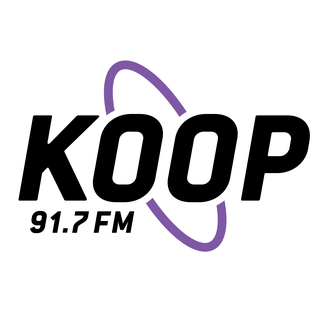Pacifica Foundation is an American non-profit organization that owns five independently operated, non-commercial, listener-supported radio stations known for their progressive/liberal political orientation. Its national headquarters adjoins station KPFK in Los Angeles, California.
KPFA is an American listener-funded talk radio and music radio station located in Berkeley, California, broadcasting to the San Francisco Bay Area. KPFA airs public news, public affairs, talk, and music programming. The station signed on the air April 15, 1949, as the first Pacifica Radio station and remains the flagship station of the Pacifica Radio Network.

WBAI is a non-commercial, listener-supported radio station licensed to New York, New York. Its programming is a mixture of political news, talk and opinion from a left-leaning, liberal or progressive viewpoint, and eclectic music. The station is owned by the Pacifica Foundation with studios located in Brooklyn and transmitter located at 4 Times Square.

KERA is a National Public Radio member FM station serving North Texas, United States. KERA also relays its programming to three separate FM relay translators, extending the coverage area of KERA's programming into the Sherman-Denison area, Wichita Falls, and Tyler.
KPFK is a listener-sponsored radio station based in North Hollywood, California, United States, which serves Southern California, and also streams 24 hours a day via the Internet. It was the second of five stations in the non-commercial, listener-sponsored Pacifica Foundation network.

KPOO is a community radio station licensed to San Francisco, California, United States. The station is owned by Poor People's Radio. It broadcasts from a building in the Fillmore district.
WORT is a listener-sponsored community radio station, broadcasting from 118 S. Bedford St. in Madison, Wisconsin, United States. WORT offers a range of programming.

KNDD is a commercial radio station in Seattle, Washington. It is owned by Audacy, Inc. and airs an alternative rock radio format. Its studios are located on Fifth Avenue in Downtown Seattle. The station broadcasts with an effective radiated power (ERP) of 68,000 watts. It transmits from a tower 707 meters (2,320 ft) in height above average terrain (HAAT) near Issaquah, Washington, on Tiger Mountain.

The Grassroots Radio Coalition is a coalition of community media activists. The GRC has a mailing list and holds a conference every year, but has so far not incorporated. There are no dues, no hierarchy and no bylaws. At the GRC11 in 2006, conference attendees decided to establish a steering committee to help coordinate coalition issues.

KOOP is a noncommercial community radio station owned and operated by its members and staffed by volunteers. The station broadcasts in Austin, Texas on 91.7 MHz at an effective radiated power of 3 kilowatts and is licensed to Texas Educational Broadcasting Co-operative, Inc., a nonprofit organization. The station was assigned the KOOP call letters by the Federal Communications Commission on October 27, 1993.
WPFW is a talk and jazz music community radio station serving the greater Washington, D.C. metropolitan area. It is owned by the Pacifica Foundation, and its studios are located on K Street Northwest. The station’s slogan is "Jazz and Justice."

KBOO is a non-profit organization, listener-funded FM Community radio station broadcasting located in Portland, Oregon. The station's mission is to serve groups in listening areas who are underrepresented on other local radio stations and to provide access to the airwaves for people who have unconventional or controversial taste and points of view. It broadcasts 24 hours a day, seven days a week, and has been on the air since 1968.

KRFC is a community-based FM radio station in Fort Collins, Colorado. The station is owned and operated by Public Radio for the Front Range. The station's programming includes music of numerous genres, played by volunteer DJs. Some news, information and syndicated shows are on the schedule as well. Although similar in funding strategies to a traditional public radio station, KRFC is not a member of any of the major networks such as NPR or Pacifica.
KSER is a non-commercial radio station and airs a mix of music and news/public affairs. The station, which is owned and operated by the non-profit KSER Foundation, broadcasts at 90.7 MHz with an ERP of 5.8 kW and is licensed to Everett, Washington.
KCFR-FM is a radio station in Denver, Colorado, which is owned and operated by Colorado Public Radio and simulcast to several AM and FM stations throughout the state. The signals from some of these stations also extend into eastern Utah and southern Wyoming. Some of KCFR-FM's programming is heard on KPRE 89.9 FM in Vail, which also carries programming from classical music station KVOD, also located in Denver.
KKFI is a radio station located in Kansas City, Missouri, owned by Mid-Coast Radio Project, Inc., a 501(c)(3) nonprofit. Formed in 1988, it broadcasts at 100,000 watts. Its music programming includes blues, jazz, reggae, rock, hip-hop, alternative, Hispanic and world music. Its local and national public affairs programming includes shows dealing with the working class, organized labor, peace, justice, LGBT, women, and alternative health issues.
Adi Gevins is a San Francisco Bay Area-based radio documentarian, producer, educator, archivist, and creative consultant who has been referred to as the "fairy godmother of community radio".

Fishers Gap is a wind gap of the Blue Ridge Mountains located on the border of Madison County and Page County in Virginia in the Shenandoah National Park. Both Skyline Drive and the Appalachian Trail pass across the gap.
Lorenzo Wilson Milam, born on August 2, 1933, in Jacksonville, Florida; died on July 19, 2020, in Puerto Escondido, Oaxaca, Mexico, was an American writer and activist who was instrumental in starting many of the first listener-supported community radio stations in the United States, beginning with KRAB in Seattle in 1962.








